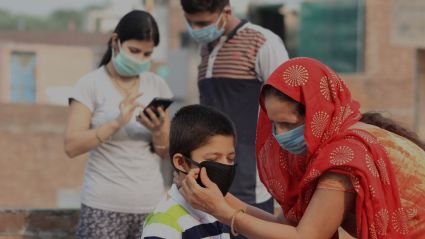
The past year was marked by the COVID-19 pandemic, which exacerbated and highlighted pre-existing racial disparities in health care, combined with the increased awareness of the persistence of racial injustice in America. As a psychiatrist, I have a broad view of the impact of the pandemic on my field through my work. Personally, I shared the stress and upheaval due to pandemic-related shutdowns, school closures, and limited contact with supportive family members and friends. I too experienced loss and grief due to the passing of several members of my community.
The stress of the pandemic was inescapable for most of us. It created a shared experience that I hope increased empathy among the general populace for what it’s like to live with uncertainty, limited resources, and grief and loss. While not an unfamiliar challenge for the unseen among us, during the pandemic, many parents experienced the challenge of how to care for children while trying to keep our jobs. Many of us found it difficult to sleep, focus, and keep our cool in the midst of the chaos.
We are now emerging from the pandemic more human, more aware of the thin line between mental wellness and mental illness. We were all made uncomfortable by the pandemic and the unrest. As we aim to rebuild post-pandemic, being uncomfortable with the status quo is actually a good place to start.
We can rebuild our mental health system to improve access to those who are so often left behind as their struggles are out of the sight.
We Must Rebuild with Greater Attention to Stress Management Skills
The COVID-19 pandemic tested many of us with unprecedented levels of stress, isolation, and loneliness. Unfortunately, we have seen increases in emergency room visits for mental health crises among children and adolescents. The COVID-19 pandemic caused many people to experience new or worsening mental health symptoms such as anxiety, depression, and substance abuse, among others. Those of us who were able to maintain our social networks, find meaningful activities, pivot to new roles, and maintain hope suffered less.
As we rebuild, we must galvanize efforts to develop and strengthen resilience in the young through empowering our next generation with general stress management skills to manage crises. This includes some basics such as physical exercise, good nutrition, spirituality, mindful reflective states, creative outlets, good sleep, and talking about feelings/seeking help. This needs to begin in early childhood education and embedded in the social emotional learning curriculum. We will destigmatize mental illness by making the case for mental health as a part of total health. When we strengthen all our responses to stress, then our most vulnerable members of society will benefit as well. Programs such as the American Psychiatric Association Foundation’s Notice.Talk.Act. can help schools and employers prepare to identify and support those struggling with signs of mental illness.
We Must Rebuild with an Equity Lens
The COVID-19 pandemic highlighted and exacerbated disparities in health as evidenced by the greater likelihood of severe infection and death among African Americans, Latinos, and Native Americans compared to White Americans. Racial injustice has no place in our health-care system, yet these racial disparities exist because of longstanding inequities and historical factors.
Rebuilding from COVID-19 with an equity lens will involve strengthening efforts to identify structures and systems that interfere with access to mental health care by minority racial groups. It will involve a focus on prevention and treatment of medical and psychiatric illness from a holistic, trauma-informed, culturally humble, strengths-based, community-oriented perspective. It means tackling social determinants of health that impact access to mental health care in the form of missed visits, lack of engagement, and difficulty affording, finding, and prioritizing mental health care.
We Must Rebuild with a New Set of Expectations about Engaging Patients
The COVID-19 pandemic forced the entire mental health field to rapidly adapt to using telehealth even though, previously, it was only used in a limited way due to various barriers to change. As a result, those seeking mental health care for themselves or a loved one could do so from the comfort of their own homes. What a transformation! So many more are able to benefit from the healing interventions that mental health professionals are able to offer. This mode of care delivery eliminated a major barrier to help seeking for those who were busy, stressed about waiting in a mental health clinic, disabled, socially anxious, treatment hesitant, among others.
As we rebuild, we must retain and enhance flexible means of engagement with help seekers. We must continue to ensure insurance coverage for phone sessions, video, and, of course, the familiar and essential in-person visits. Improving access to broadband will be essential to ensure all can have equitable access to telehealth.
As we rebuild, let’s do so with greater stress management skills, with an equity lens, and with flexible ways of engaging with help seekers. The challenge is for us to rebuild with empathy after a year of collective struggle and discomfort. As such, we can rebuild our mental health system to improve access to those who are so often left behind as their struggles are out of our sight.















